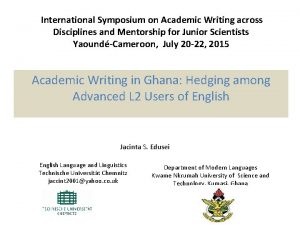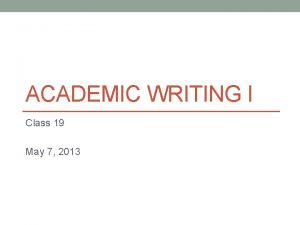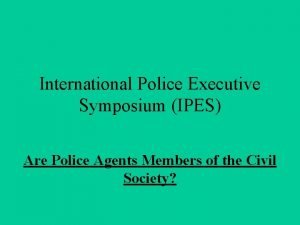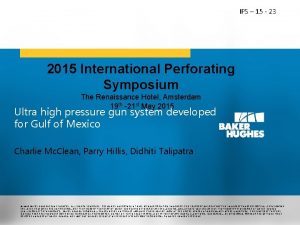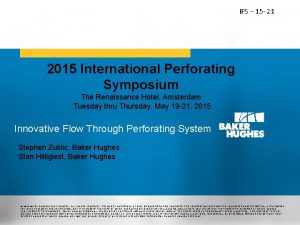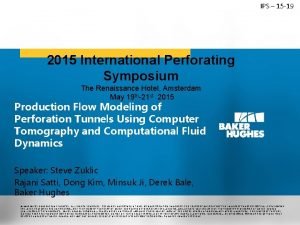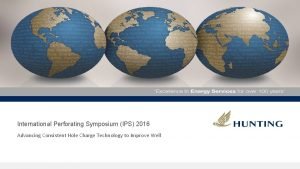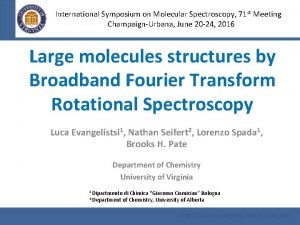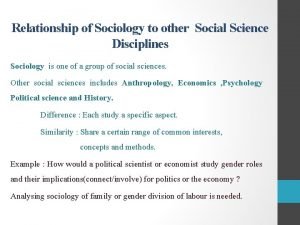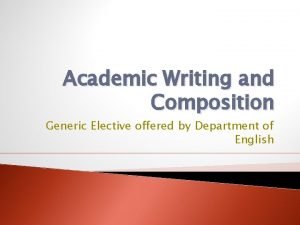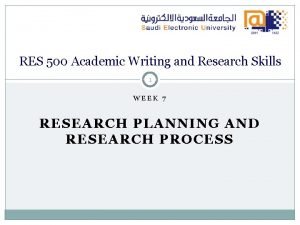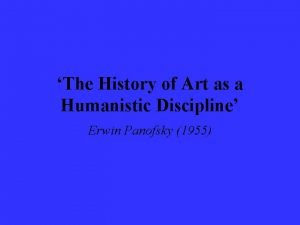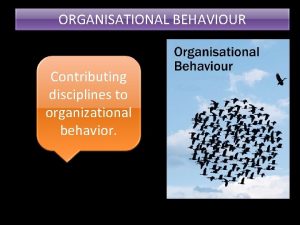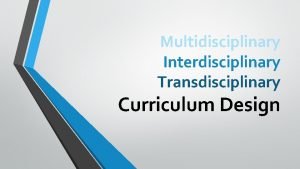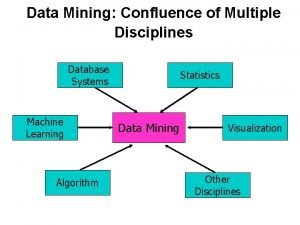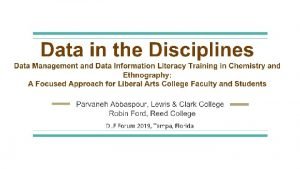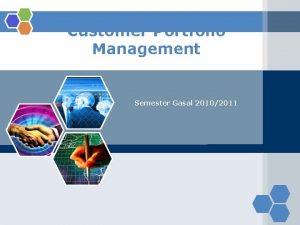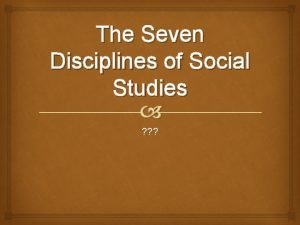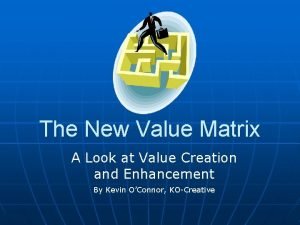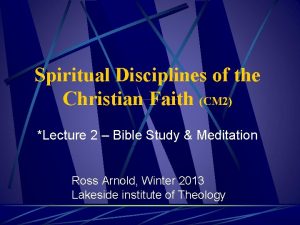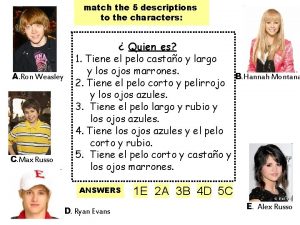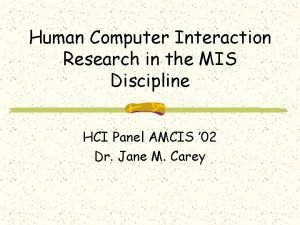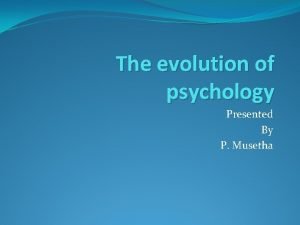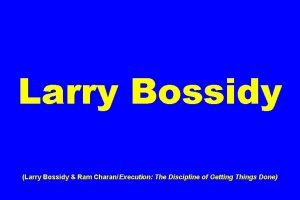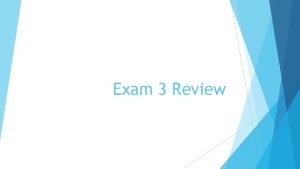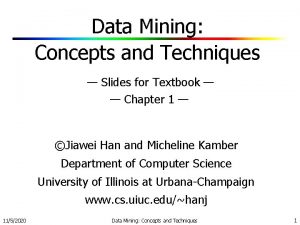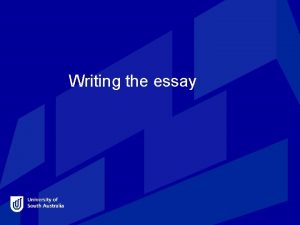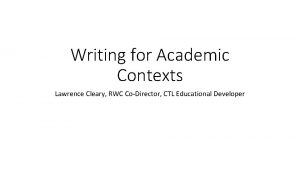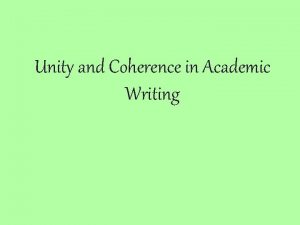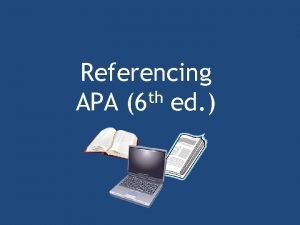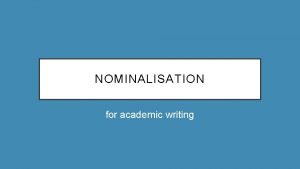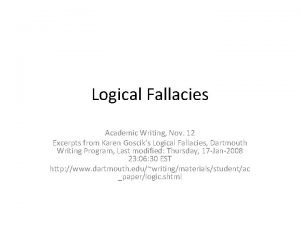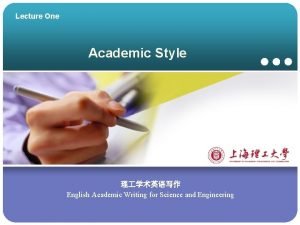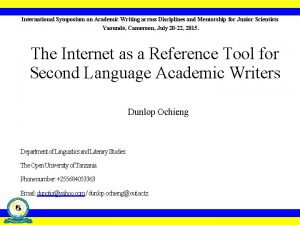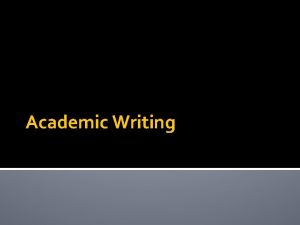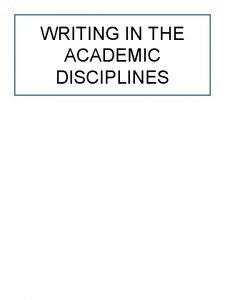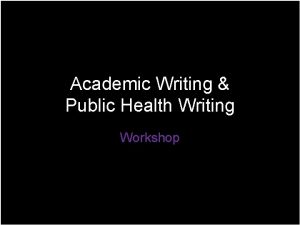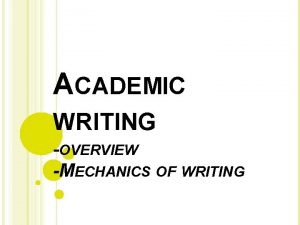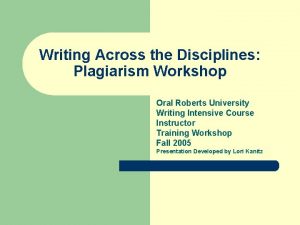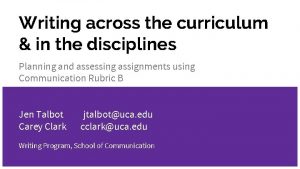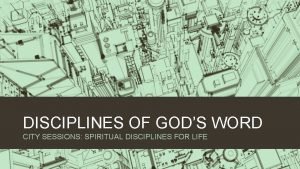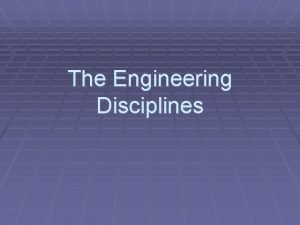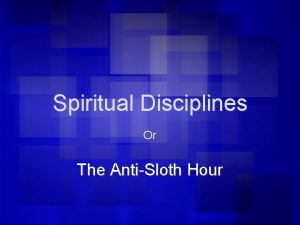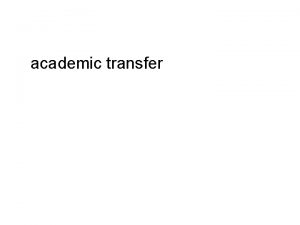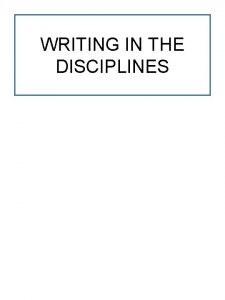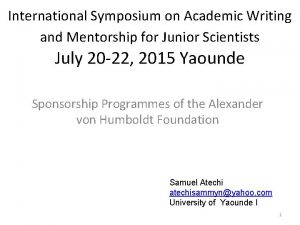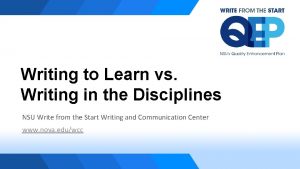International Symposium on Academic Writing across Disciplines and







































- Slides: 39

International Symposium on Academic Writing across Disciplines and Mentorship for Junior Scientists DR. COMFORT OBEN OJONGNKPOT UNIVERSITY OF BUEA comjohson@yahoo. com Yaoundé, July, 20 - 22, 2015

Study Title • Accomplishing Scientific Writing: the case of the long essay at the University of Buea

outline • • • • Introduction/Definition of Key Terms Statement of the Problem Research Questions Literature Review Theories Methodology Research Design Instruments for Data Collection Data Elicitation Procedure Data Analysis Procedure Preliminary Findings/Results Recommendations Conclusion References

1) INTRODUCTION/KEY CONCEPTS • The long Essay(LE) is termed variously as ‘project’, ‘term paper’, ‘research paper’, and ‘dissertation’, to describe a formal paper requiring research, good writing skills, documentation, organization and thoughtful writing, followed by careful editing. • Characterized by rules of form, objective style, forms for typing, in-text citations, and end- references • Sometimes, an institution chooses one format for all students to follow • ‘Long’ because it needs more planning , unlike the ‘Short’ that can be done at- a- go from start to finish.

2) Introduction/Key concepts • LE gives opportunity to final – year undergraduates to pursue topics of their own, subject to a supervisor to enable them develop critical & research skills as well as to plot and structure critical argument on a large scale(Bloch, 2015). • Chosen topic may arise from work done on any of the courses or independent of course work done so far. Students are expected to demonstrate grasp of topics by exploring relevant critical debates & positioning developed point of view within the context of the debate (Tarpley, 2007). • It is indeed the first writing task that sets the pace for undergraduates’ scientific writing career •

3)Introduction/Key Concepts • Not more that 8000 words. • Hence, much reading before meeting the supervisor. • It is useful in evaluating its relevance for use as an outcome measure for more advance writing tasks • Scientific writing (academic writing), focuses on letting the reading- audience perceive what the author had in mind i. e. ‘quality results in reader clarity, aims at delivering certain knowledge to readers’(Mc. Carthy & Walvoord, 2006). • Accomplishing: conceiving and completing a piece of formal writing(long essay).

1) STATEMENT OF PROBLEM • Undergraduate students at UB are adequately prepared for future writing tasks as are subjected to relevant courses : Use of English I & 2(ENG 101 & 102), and Research Methods( 380). • However, at the final year, it is observed that they panic when presented with writing tasks based on thoughtful writing and research methods. • Thus, during supervision sessions, it is common to hear complaints like: madam, I don’t know how to start writing, I don’t know where and how to get a topic, I am confused between introduction and background, etc. • Such apprehensions in the writing tasks lead them to produce texts void of various conventions in author- reader-interaction, which of course are often not reader-appropriate(schmied, 2015).

2)STATEMENT OF THE PROBLEM • Such inherent difficulties exhibited by students in the writing endeavor prompted Rose (1989) to describe the L 2 Learner as ‘an outsider to the academic community’. • What then is the aim of this study?

AIM OF THE STUDY • This study aimed at investigating the difficulties (in writing and research methodology skills) faced by final year undergraduates at the University of Buea, in conceiving and completing their projects( long essays), in order to lay a solid foundation for advance academic writing,

OBJECTIVES • Specific Objectives • To develop skills of conceiving and carrying out research in studies across disciplines by examining the difficulties experienced by 50 Level 400 students in the course of project writing , and then propose some practical measures of how to surmount such hurdles. • To elaborate a long essay project in studies across disciplines that contribute in advancing knowledge in various disciplines and language learning/teaching, using methodological tools and attaining quality for accomplishing scientific writing which will definitely lead to more advance genres.

. RESEARCH QUESTIONS • 1) What types of texts do Undergraduate finalyear students at the University of Buea produce in their Long Essays? • 2) Undergraduate final- year students in the University of Buea lack research methodology skills.

1) LITERATURE REVIEW • • Mahon (2015), researched on the evolution of writing with distinct areas of interest and methods of inquiry. Hall (2013), worked on writing and what constitutes a finished research work. Schmied (2015) compared academic writing in Europe at the background of a research-based approach. (Bloch 2012; Bennett 2005; Hayes & Introna 2005), dwelt on outright copying, going against intellectual property rights. Pamplon (2005), examined general writing strategies in Spanish & English. Santos (2006), compared students’ lexical strategies and dictionary use in Spanish and English writing. Gonzalez & Roux, (2007) investigated academic writing and the use of peer feedback.

2) LITERATURE REVIEW Swales, (1990), Hyland (2000), Tandy (2009), talk about genre in L 2 Writing, focus on how authors use texts, to incorporate norms to help students better understand how academic papers are situated within the process of knowledge creation. • (Camps, 1999; Ivanic & Camps, 2001 and Perales, 2005) worked on the difficulties and expectations of Masters students during their writing programmes • Mugford and Sughrua (2007), examined the personal voices of undergraduate EFL students in the process of writing their theses. •

1) THEORETICAL FRAMEWORK • 1)The Cognitive Theory of Composition (The Cognitive Theory) by Lev Vygotsky (1978) stipulates ‘reciprocal teaching’, used in improving students’ ability to learn from texts wherein students and teacher collaborate in learning and practicing four key skills: summarizing, questioning, clarifying and predicting. • 2) The Cognitive Process of Writing (Linda Flower & John Hayes, 1981), based on gaining insight into the writing process through the writer’s thought processes.

2)THEORETICAL FRAMEWORK • 3)The Living Educational Theory(LET)(Barry, 2012), who later called it 'researching our own practice’(2013) while Carson & Samarra(1997) had considered it ‘Action Research’ which emphasizes lived practices that require the researcher investigating the subjects and also providing an account of how investigation both shapes and is shaped by the investigator.

1) METHODOLOGY • Research Design • Critical Incidence: critical factors like errors, inappropriate practices in a given context were identified and characterized , making use of qualitative and quantitative methods and analysis. • The reading of the project drafts was considered a context –specific act in which meaning was constructed, with terms like adequate and inadequate, based on the explicit rules and assumptions of the supervisor, and by extension, the reader. • An adequate or inadequate long essay is one that received a ‘high’ and ‘low’ rating respectively, judged by the supervisor’s reflection. The qualitative approach consisted of identifying problems faced by students, done essentially through researcher’s observation. • In order to understand students’ perspective, & experience in research and the difficulties they faced, interviews and focus- group discussions were done. • • The quantitative weighted factors related to long essay writing and perceived in a ranking order.

2) METHODOLOGY Data Collection Procedure • Collected through the years(2010 -2015), recordings done in categorical form (numerical scale), . • The researcher took down notes of each long essay read during supervision, focusing on the pitfalls based on writing skills and methodological lapses • Observations were marched against a scale with inscriptions headed as: ‘adequate’, and ‘inadequate’, and conclusions drawn. • Scales rated various aspects phenomena of writing (Table 1, below).

3) METHODOLOGY • Participants • 50 L 2 Final -year Undergraduates in the University of Buea, (from 2010 -2015), 36 girls and 14 boys, aged between 19 and 23. • Have all taken courses in Use of English (ENG 101 &102), and Research Methodology ( 380). • Had previously done writing as part of their curriculum from Primary to Secondary School, with a pass in Ordinary Level English, • The researcher is a near-native speaker of English, trained in English Language Teaching and Applied Linguistic research with 20 years of English Language teaching both at secondary and university levels.

POPULATION OF THE STUDY

4) METHODOLOGY • Data Analysis Procedure • Content Analysis Approach: made use of a list of standard indicators of writing and research methodology and related students performance after reading the texts and interacting with the students to each of the indicators. The researcher for instance could classify a student under ‘devoting time’, ‘getting a topic’, ‘using linguistic structures’, etc.

5) METHODOLOGY • As for students’ perception of hindering factors to Long Essay Writing, Thematic Analysis Approach was used to group viewpoints under umbrella terms with the support of Atlas Ti 5. 2 (Atlas Ti GMBH, 2006). • Given the nominal nature of the sample, Simple Counting Technique was used to organize results in statistical tables • Chi-Square Test of Independence or Equality of Proportion was used to determine significant levels of association or difference/independence with the support of Epi Info 6. 04 d (CDC, 2001). • Data were summarized in statistical tables, charts and code-grounding-quotation tables.

Table 2: Thematic analysis depicting problems faced by students in the course of writing their long essays: code-grounding –quotation table

Table 2 cont’d: Thematic analysis depicting problems faced by students in the course of writing their long essays: code-grounding –quotation table

Table 3: Content Analysis Output Characterizing Indicators of Writing Long Essays

3)PRELIMINARY FINDINGS • Based on the indicators of writing and research methodology skills from the students’ texts, it was observed that the male and female students did not differ significantly in their performance for all the indicators as (χ2 -test: P>0. 05). • Difficulty in reviewing related literature, ’ • Lack of writing skills(difficulties in taking notes, paraphrasing and quoting) , 47(94. 0%) respondents under the indicator that concerns lack of writing skills, and 29(57. 3%) respondents for another indicator that has to do with writing skills, ‘difficulty in proof-reading and revising • Lack of statistical ability • Difficulty in documenting sources • Difficulty in sourcing information(difficulty in gathering information)

4)PRELIMINARY FINDINGS • This makes us to postulate that final –year undergraduates in the University of Buea do not use reader-appropriate texts; lacking in writing and methodological skills, which is in line with Bloch (2012) who opines that students lack rules which are indispensible for accomplishing academic writing. We see this indicator as a very serious problem based on the very high response rate on ‘inadequate’ indicators(Table 3)

5)PRELIMINARY FINDINGS • We observed that the bulk of the problem was the mastery of research methodology skills as seen in Table 3 above. ’Difficulty in documenting sources’ 31(62. 2%), • ‘lack of statistical ability’ 30(60. 6%), • ‘difficulty in reviewing literature 47(94. 0%). This very high rate of responses is in line with (Hall, 2010 & Tarpley , 2007)

1)RECOMMENDATIONS • Getting a topic: Students need to visit existing Long Essays and look at the Section, Suggestions for further research. • Getting started after having chosen a topic: students must start by doing some reading even before meeting supervisor • Writing the research: start writing, elaborating on a one page proposal above, adding their own twist on the problem, outlining initial thoughts, results and findings and outlining a clear plan to continue the work.

2)RECOMMENDATIONS • Gathering Information: from news, course material, common sense, Library, Computer(internet and web searches) • Taking Notes, summarizing, paraphrasing and Quoting write down the source, make a list of all the sources by using note cards, which you organize according to the way in which you would love to organize your paper. During note- taking, write down the page numbers

3) RECOMMENDATIONS • Record the authors’ ideas by using your own words as much as possible. • Do a brief or précis of the text capturing the main ideas, maintaining the meaning of the original text • Like paraphrasing, you need to acknowledge the author by including his surname, and page number.

4) RECOMMENDATIONS • Documenting Sources: create a citation using any recognized citation format. – • Using sources: -Get sources from magazines, journals, books, newspapers, videos, films, computers, discussion groups, surveys, or interviews. need to find appropriate sources that match your research. • Reviewing Literature: under main themes that emerge from the readings of the literature, starting.

5)RECOMMENDATIONS • 1) Building the Body of the Research: It is easy to write once you know what to write about. Especially after having written thesis statement, you are ready to build the body of the study. • The thesis statement is the central idea of the essay, it is usually followed by: paragraphs that develop thesis, explaining your ideas and backing them up.

6)RECOMMENDATIONS • • • Revising and Proof Reading the Draft: until you go over what you have written many times, to improve upon it, then can you say you have finished the writing process. That is why revision is termed, revision, seeing things again. The completed work should have at least five chapters (adapted from Hall(2007). -Chapter One: Introduction -Chapter Two: Review of Related Literature -Chapter Three: Methodology -Chapter Four: Results and Discussion -Chapter Five: Summary, Conclusion, Recommendations and Suggestions for further Studies - References/Bibliography - Appendix

CONCLUSION • The study aimed at investigating difficulties encountered by final-year undergraduates across disciplines at the University of Buea in writing their long essays which are a foundation to accomplishing scientific writing. • Preliminary results of the study proved that this group of students are yet to grasp two main aspects of accomplishing scientific writing(writing skills and research methods). Consequently, pertinent recommendations are advanced in a bid to ameliorate the situation.

REFERENCES • • • Bennet, R. (2005). Factors associated with student plagiarism in a post 1992 university assessment & Evaluation in Higher Education, 30, 137 -162. Bloch, Joel, (2012). Plagiarism, Intellectual Property and the Teaching of L 2 Writing. New perspectives on Language and Education. Edwards(ed. ) multilingual Matters Camps, M. (1999). How far have we got in preparing students for written assignments at English-speaking universities? Identifying the need for writing assignments of three Mexican Masters students at a British university. MEXTESOL Journal, 23(1), 19 -32 Crawford, T. (2007). ESL writing in the University of Guanajuato: The struggle to enter a discourse community. Unpublished doctoral dissertation, Canterbury Christ Church University, United Kingdom. Gonzalez, F. & Roux, R. (2007). The use of peer feedback in the EFL classroom. Revisita Hall, Hazel, (2013). Writing up your Dissertation/ Project hand-out on writing for undergraduate students undertaking the Honours Project Module at Edinburg Napier University. academia. edu

REFERENCES Hayes, N. & Introna, L. (2005). Cultural Values, Plagiarism, and Fairness: when plagiarism gets in the way of learning. Ethics & Behavior, 15(3), 213 -231. Hyland, K. (2002). What do they mean? Questions in academic writing. Text, 22(4), 529 -557. Introna, L. Hayes, N, Blair, L & Wood, E. (2003). Cultural Attitudes towards plagiarism: Developing a better understanding of the needs of students from diverse cultural backgrounds relating to issues of plagiarism Retrived 6 June, from http//sites google. Com/site/ lucasintrona/home/reports. Ivanic, R. , & Camps, D. (2001). I am how I sound: Voice as self-representation in L 2 writing. Journal of Second Language Writing 10, 3 -33. Mcleod, S. A. (2007). Lev Vygostky. Retrieved from www. simplypsychology. org/vygostky. html Mugford, G. , & Sughrua, W. (2007). The role of the teacher as students struggle for participation and a ‘voice’ in the writing of their B. A. thesis in English. MEXTESOL Journal, 31(2). 73 -79

REFERENCES Padilla, Beatriz, ( 2014 ). Teaching Research project in Public Management wordcraft sharpen your writing skills: THE MORNING CALL News media foundation. Allentown. Pamplon, N. (2005). The writing process of four university level EFL students: A protocol based study. Unpublished masters thesis, University of London, United Kingdom. Perales, M. (2005). Variation in academic papers as related to the enculturation process of a novice NNS graduate student into academia: a case study. Unpublished masters thesis, University of Iowa, USA. Prudencio, F. E , Keranen, S. N. , & Bianco G. S. M. ( 2010). An overview of EFL Writing research in Mexico: What is Investigated and how? In Santos, S. (ed. ), EFL Writing in Mexican Universities: Research and Experience. Universidad Autonoma de Nayarit, Mexico. (8 -21). Rodriguez, V. (2008). Writing instruction in the English II Course at the Language centre-Xalapa, U. Veracruzana. unpublished masters thesis, Universidad Veracruzana, Xalapa, Veracruz, Mexico.

REFERENCES Perales, M. (2005). Variation in academic papers as related to the enculturation process of a novice NNS graduate student into academia: a case study. Unpublished masters thesis, University of Iowa, USA. Prudencio, F. E , Keranen, S. N. , & Bianco G. S. M. (2010). An overview of EFL Writing research in Mexico: What is Investigated and how? In Santos, S. (ed. ), EFL Writing in Mexican Universities: Research and Experience. Universidad Autonoma de Nayarit, Mexico. (8 -21). Rodriguez, V. (2008). Writing instruction in the English Meif Course at the Language centre-Xalapa, U. Veracruzana. Unpublished masters thesis, Universidad Veracruzana, Xalapa, Veracruz, Mexico. Santos, S. (2006). Strategies for solving lexical problems in writing. Proceedings of the XXXIII Convecion internacionnal de MEXTESOL Journal 74 -78. Santos, S. (2010). EFL Writing in Mexican Universities: Research and Experience. Universidad Autonoma de Nayarit, Mexico. Schmied, J, (2015). Graduate Academic Writing in Europe in Comparison: A Research. Based Approach to Metalanguage and Genre. In J. Schmied (ed. ). Graduate Academic Writing in Europe in Comparison: Research in English & Applied Linguistics. Cuvillier Verlag. 1 -24.

THINK ABOUT THIS!!!! • If the reader is to grasp what the writer means, the writer must understand how the reader reads. (Gopen &Swan, 1990) THANK YOU FOR THINKING!
 Academic english reading and writing across the disciplines
Academic english reading and writing across the disciplines Patterns of development in writing across disciplines
Patterns of development in writing across disciplines Differentiate academic writing with technical writing.
Differentiate academic writing with technical writing. Business writing vs academic writing
Business writing vs academic writing International police executive symposium
International police executive symposium International perforating symposium
International perforating symposium International perforating symposium
International perforating symposium Chara screenshot
Chara screenshot International perforating symposium
International perforating symposium International perforating symposium
International perforating symposium International perforating symposium
International perforating symposium International symposium on molecular spectroscopy
International symposium on molecular spectroscopy Sociology as social science
Sociology as social science Academic writing and composition
Academic writing and composition Academic writing and research skills
Academic writing and research skills Humanistic disciplines
Humanistic disciplines Disciplines of organisational behaviour
Disciplines of organisational behaviour Multidisciplinary vs interdisciplinary
Multidisciplinary vs interdisciplinary Confluence miner
Confluence miner Data management disciplines
Data management disciplines What is customer portfolio management
What is customer portfolio management Engineering disciplines
Engineering disciplines Disciplines of social studies
Disciplines of social studies The value disciplines model
The value disciplines model 10 spiritual disciplines
10 spiritual disciplines Spiritual disciplines chart
Spiritual disciplines chart Match the disciplines or roles to the descriptions.
Match the disciplines or roles to the descriptions. Disciplines of hci
Disciplines of hci Data mining confluence of multiple disciplines
Data mining confluence of multiple disciplines Psychology's intellectual parents are the disciplines of
Psychology's intellectual parents are the disciplines of Larry bossidy
Larry bossidy The presence of spectators helps young athletes
The presence of spectators helps young athletes Data mining concepts and techniques slides
Data mining concepts and techniques slides Academic essay
Academic essay Uefap
Uefap Unity coherence
Unity coherence Quote about academic writing
Quote about academic writing What is nominalisation in writing
What is nominalisation in writing Logical fallacies in academic writing
Logical fallacies in academic writing What is academic style
What is academic style
